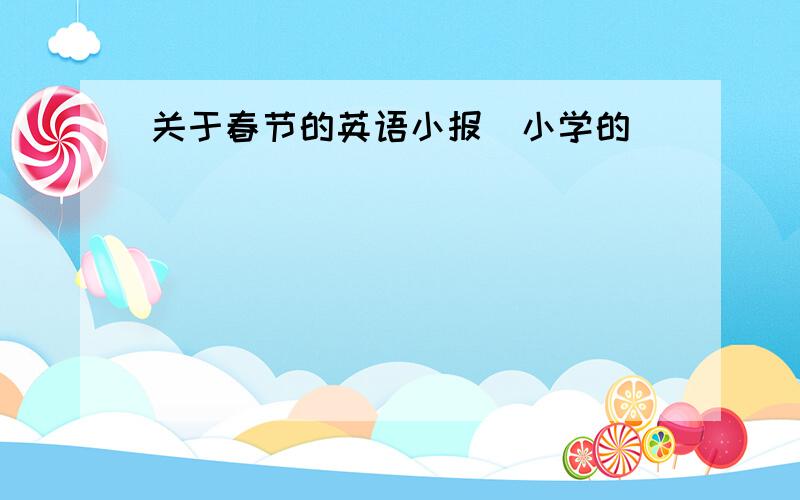关于春节的英语小报(小学的)
来源:学生作业帮助网 编辑:作业帮 时间:2024/12/02 07:25:54

关于春节的英语小报(小学的)
关于春节的英语小报(小学的)
关于春节的英语小报(小学的)
关于春节:The Spring Festival
Spring Festival is the most important festival in China .It’s to celebrate the lunar calendar ‘s new year .In the evening before the Spring Festival ,families get together and have a big meal .In many places people like to set off firecrackers .Dumplings are the most traditional food .Children like the festival very much ,because they can have delicious food and wear new clothes .They can also get some money from their parents. This money is given to children for good luck . People put New Year scrolls on the wall for good fortune .
The Spring Festival lasts about 15 days long .People visit relatives and friends with the words “Have all your wishes ”. People enjoy the Spring Festival ,during this time they can have a good rest . 春节是最重要的节日在中国.它是庆祝阴历的新年.在晚上在春节之前,家庭聚会并且有一顿大膳食.在许多地方人们喜欢引起爆竹.饺子是最传统的食物.因为他们可以食用可口食物和穿新的衣裳,孩子喜欢节日非常.他们可以从他们的父母也得到一些钱. 这金钱被给孩子为好运. 人们在墙壁上把新年纸卷放为好运.
春节久持续大约15天.人拜访亲戚朋友说“愿一切如愿”.在这时间 他们可以有好休息的人们享受春节.
春节前:Things Happened in Spring Festival Today, I went shopping with my parents, grandparents, aunts, uncles, and cousins. It was a rare occasion because we hardly only get together few times in a year as a big family. On the way to the shopping mall, we watched the lion dance. Overall, we had an unforgettable day.
The Origin of Chinese New Year
The Chinese New Year is now popularly known as the Spring Festival because it starts from the Begining of Spring (the first of the twenty-four terms in coodination with the changes of Nature). Its origin is too old to be traced. Several explanations are hanging around. All agree, however, that the word Nian, which in modern Chinese solely means "year", was originally the name of a monster beast that started to prey on people the night before the beginning of a new year.
One legend goes that the beast Nian had a very big mouth that would swallow a great many people with one bite. People were very scared. One day, an old man came to their rescue, offering to subdue Nian. To Nian he said, "I hear say that you are very capable, but can you swallow the other beasts of prey on earth instead of people who are by no means of your worthy opponents?" So, it did swallow many of the beasts of prey on earth that also harrassed people and their domestic animals from time to time.
After that, the old man disappeared riding the beast Nian. He turned out to be an immortal god. Now that Nian is gone and other beasts of prey are also scared into forests, people begin to enjoy their peaceful life. Before the old man left, he had told people to put up red paper decorations on their windows and doors at each year's end to scare away Nian in case it sneaked back again, because red is the color the beast feared the most.
From then on, the tradition of observing the conquest of Nian is carried on from generation to generation. The term "Guo Nian", which may mean "Survive the Nian" becomes today "Celebrate the (New) Year" as the word "guo" in Chinese having both the meaning of "pass-over" and "observe". The custom of putting up red paper and firing fire-crackers to scare away Nian should it have a chance to run loose is still around. However, people today have long forgotten why they are doing all this, except that they feel the color and the sound add to the excitement of the celebration.
Far and away the most important holiday in China is Spring Festival, also known as the Chinese New Year. To the Chinese people it is as important as Christmas to people in the West. The dates for this annual celebration are determined by the lunar calendar rather than the Gregorian calendar, so the timing of the holiday varies from late January to early February.
To the ordinary Chinese, the festival actually begins on the eve of the lunar New Year's Day and ends on the fifth day of the first month of the lunar calendar. But the 15th of the first month, which normally is called the Lantern Festival, means the official end of the Spring Festival in many parts of the country.
Preparations for the New Year begin the last few days of the last moon, when houses are thoroughly cleaned, debts repaid, hair cut and new clothes purchased. Houses are festooned with paper scrolls bearing auspicious antithetical couplet (as show on both side of the page) and in many homes, people burn incense at home and in the temples to pay respects to ancestors and ask the gods for good health in the coming months.
"Guo Nian," meaning "passing the year," is the common term among the Chinese people for celebrating the Spring Festival. It actually means greeting the new year. At midnight at the turn of the old and new year, people used to let off fire-crackers which serve to drive away the evil spirits and to greet the arrival of the new year. In an instant the whole city would be engulfed in the deafening noise of the firecrackers.
On New Year's Eve, all the members of families come together to feast. Jiaozi, a steamed dumpling as pictured below, is popular in the north, while southerners favor a sticky sweet glutinous rice pudding called nian gao.
我就只找来这些,不知道满不满意o(∩_∩)o...